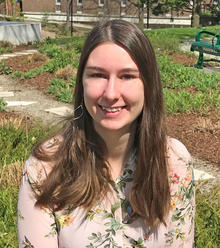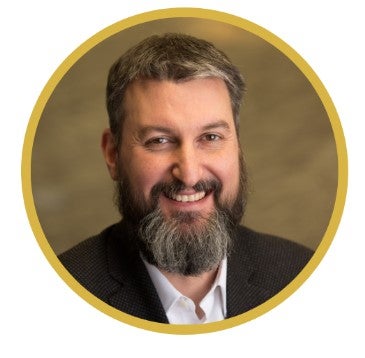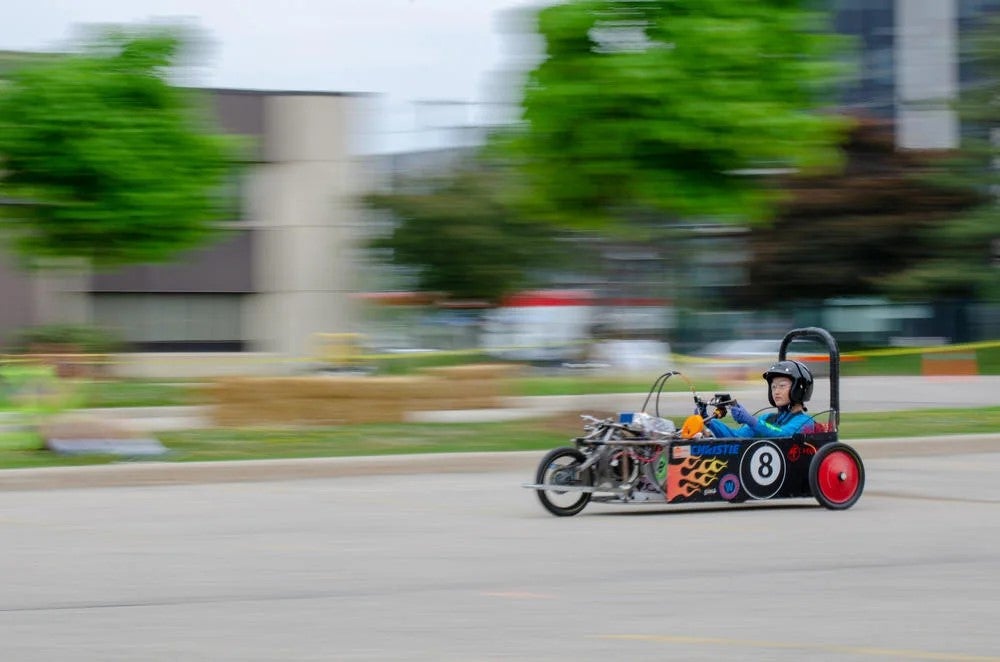Editor:
Brandon Sweet
University Communications
bulletin@uwaterloo.ca
Certificate in University Teaching award winner talks critical thinking
This article was originally published on the Centre for Teaching Excellence's website.

The Certificate in University Teaching (CUT) program provides a comprehensive teacher development experience that is open to PhD students at the University of Waterloo. Completion of the program is recognized by a certificate issued by Graduate Studies and Postdoctoral Affairs and listed on the participant’s transcript.
Each year, the Centre for Teaching Excellence and Graduate Studies and Postdoctoral Affairs award one CUT program participant in recognition and celebration of effort and reflection that go above and beyond the course requirements.
We are excited to announce that the 2019 CUT Award has been awarded to Sarah McCrackin, a PhD student in the Department of Psychology. Sarah’s research in cognitive neuroscience focuses on understanding the significance of eye gaze in social interactions with respect to understanding what people are thinking and feeling.
The award recognizes Sarah’s self-reflection throughout the program—with respect to personal teaching goals, pedagogical choices, and strengths as well as areas that need improvement.
We spoke to Sarah about her experience with the CUT program and her thoughts about teaching in a post-secondary environment.
Can you tell us more about the workshop you developed as part of the CUT program?
It was designed to help instructors implement three empirically supported strategies for teaching students critical thinking. Critical thinking is a huge part of what I do as a research scientist, and it's so important for raising informed citizens. When I set out to create the workshop, I reviewed the research and picked out strategies that have been repeatedly shown to strengthen critical thinking in students.
You were recognized in part because of the depth of your self-reflection. What kinds of reflection did the CUT program stimulate for you? Has that reflection had an impact on your teaching?
The CUT program gives you so many opportunities to try new things and see what works for you. You also have opportunities to reflect on what worked and what didn't. There were some active learning strategies that I thought were really effective at engaging students and some that didn't work. Towards the end of the program, you get to create a teaching dossier, and I think that's where I did the most reflecting. I identified my core beliefs about teaching and core strategies that I use in my lectures, and those made up my teaching philosophy. Now, whenever I'm working on a new lecture, I go back to my philosophy and make sure that my lectures align with it.
Do you have any advice for new instructors or graduate students interested in teaching?
My advice for graduate students is to not be afraid of trying new things. I think it can be easy to settle into a routine with your lectures, but trying new things is so important for improving and innovating as a teacher. I can't recommend the CUT program enough, because it helps you do that. You go to all these workshops that explore new teaching strategies and it's a safe way to try something new. Anyone who is interested in teaching should go for it as a way to gain confidence in teaching by working with a team of people whose job it is to help you be the best teacher you can be.
Forbes Lecture to focus on aging and technology
Two key themes in today’s world – aging and technology – will be addressed at a special event on June 18. The Network for Aging Research (NAR) invites you to the second annual William F. Forbes Lecture, at which keynote speaker Alex Mihailidis, scientific director of the AGE-WELL Networks of Excellence and a professor of rehabilitation technology at the University of Toronto, will speak on “Technology and Aging: Supporting our Current and Future Selves.”

Mihailidis focuses on the development of new technologies and services for older adults. He has been conducting research in the field of pervasive computing and intelligent systems in health for the past 15 years, investigating the development of intelligent home systems for elder care and wellness, technology for children with autism, and adaptive tools for nurses and clinical applications.
Please register for this free event, which includes poster presentations, interactive booths and refreshments, by Tuesday, June 4, as space is limited.
The annual Forbes Lecture series highlights a keynote speaker in the field of gerontology every year, and is named in honour of former Math dean and founder of the gerontology program at Waterloo, William Forbes. The Network for Aging Research is a networking resource for aging-focused researchers, and fosters collaborative aging research across the University.
Electric Vehicle challenge and other sparks of wisdom

The Faculty of Engineering will be hosting the annual Waterloo High School Electric Vehicle (EV) Challenge on Sunday, May 26. The event encourages students to design and test their own electric car in an annual endurance competition.
All races take place in a course around the East Campus buildings in Parking Lot Q on Sunday.
There will be two 12 volt races and one 24 volt race, with registration starting at 8:00 a.m. The awards will be handed out at 3:30 p.m. The winners of the 24 volt race will receive the coveted TADA Cup.
There’s still time to submit an application for the Staff Enhancement Experience (SEE) Canada Grant. The Grant provides an opportunity for regular full-time University staff members to further their professional development through idea-exchange and learning alongside counterparts at other Canadian universities, colleges, research institutions or industry-partner organizations.
"This is an excellent opportunity for staff to travel, build lasting professional relationships and bring back new insights to their roles at the University of Waterloo," wrote Director, HR Client Services Michelle Hollis in a memo circulated to staff yesterday.
The deadline for applications is Friday, May 31. You can download the application form and find out more on the SEE Canada webpage. Anyone with questions is invited to email seecanada@uwaterloo.ca.
Link of the day
When and Where
Problem Pitch Competition open for applications from Tuesday, May 21, 12:00 a.m. to Sunday, June 2, 11:59 p.m.
IT Seminar: Student Service Centre Update and Tour, Friday, May 24, 9:00 a.m. to 9:45 a.m., NH 3318.
Fundamentals for Writing Your Thesis, Friday, May 24, 9:00 a.m. to 4:00 p.m., EV3 4408 and 4412.
EV Challenge, Saturday, May 25, Sunday, May 26, 8:00 a.m. to 4:00 p.m., Q Parking Lot. Note that the event has been postponed one day due to risk of thunderstorm.
Experience Part-Time Master of Business, Entrepreneurship and Technology (MBET), Saturday, May 25, 11:30 a.m. to 2:00 p.m., Engineering 7 (E7) - 2nd Floor, Conrad School Hub.
SynBio4.0 conference, Sunday, May 26 to Tuesday, May 28, DC 1302 and Engineering 7. Register today.
Velocity Fund $5K applications open,“Today’s Velocity Fund winners, tomorrow’s innovative companies,” Monday, May 27.
Clarity in Scientific Writing, Monday, May 27, 9:00 a.m., SCH 228F.
UW Blooms, Monday, May 27, 10:30 a.m. to 4:00 p.m., Student Life Centre Multipurpose Room.
Coping Skills Seminar - Thriving With Emotions, Monday, May 27, 3:00 p.m., HS 2302.
Résumé Tips – employees, Tuesday, May 28, 12:00 p.m. to 1:00 P.M., TC 2218.
Waterloo Women's Wednesdays: The Screentime Question, Wednesday, May 29, 12:00 p.m. to 1:00 p.m., MC 5479.
Networking for Job Search – graduate students, Wednesday, May 29, 1:30 p.m. to 3:00 p.m., TC 2218.
Geotab info session and EV Solutions demo, Wednesday, May 29, 3:00 p.m. to 5:00 p.m., SDC Student Design Centre, E5 first floor.
Velocity Start: Ain’t No Model Like a Business Model, “Learn how to build a lean business canvas.” Wednesday, May 29, 7:30 p.m., Velocity Start, SCH 2nd Floor.
New Manager Onboarding session, Thursday, May 30, 8:30 a.m. to 4:30 p.m., EC 1023.
Say it in Your Own Words: Paraphrase & Summary for Graduate Students, Thursday, May 30, 10:00 a.m., SCH 228F.
Faculty Networking Event: Biomechanics and Musculoskeletal Health in Aging and Disease, Thursday, May 30, 10:30 a.m. to 1:00 p.m., EC5-1111. Please register. Open to faculty and post docs. This event is supported by CBB.
Funding the Quantum Enterprise: Canadian Non-equity Sources, Thursday, May 30, 12:00 p.m. to 1:30 p.m., RAC 1 3003.
The Centre for Teaching Excellence presents - Statements of Teaching Philosophy – graduate students, Thursday, May 30, 1:30 p.m. to 3:30 p.m., TC 1208.
Graduate Student Stress Management Group, Thursday, May 30, 3:30 p.m., HS 2302.
What is Velocity?, Thursday, May 30, 7:00 p.m., Claudette Millar Hall Main Hall.
CBB Biomedical Discussion Group Seminar featuring Dr. Blanka Sharma, Assistant Professor, Biomedical Engineering, University of Florida, “Engineering Nanomaterials for Applications in Regenerative Medicine and Cancer Immunotherapy,” Friday, May 31, 2:00 p.m. to 3:00 p.m., Engineering E6-4022. Register.
Alumni weekend, Saturday, June 1, 9:00 a.m. to 10:00 p.m., various locations on campus.
NEW - Bike Month, Saturday, June 1 to Sunday, June 30, across campus.
NEW - Bike Challenge, Saturday, June 1 to Sunday, June 30, across campus.
Grammar Studio: Workshop 1, Monday, June 3, 1:00 p.m., SCH 228F.
LGBTQ+ Making Spaces, Tuesday, June 4, 9:00 a.m. to 4:00 p.m., STC 2002.
NEW - Bike Repair Lunch and Learn, Wednesday, June 5, 12:00 p.m. to 1:00 p.m., EV3-3412.